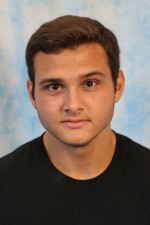PhD Speaking Qualifier
Carnegie Mellon University
Open-world 3D Object Detection
Abstract: Perception for autonomous robots presents a set of unique challenges: finding the right representation for 3D signals, adapting to an open-world setting, and exploiting geometric priors. Successfully detecting objects regardless of their labels lays a solid foundation for safe navigation. I will present two of my recent works in this line. First, I will [...]
When to use CNNs for Inverse Problems in Vision
Abstract: Reconstruction tasks in computer vision aim fundamentally to recover an undetermined signal from a set of noisy measurements. Examples include super-resolution, image denoising, and non-rigid structure from motion\cite{Kong_2019}, all of which have seen recent advancements through deep learning. However, earlier work made extensive use of sparse signal reconstruction frameworks (e.g. convolutional sparse coding). While [...]
Tendon Driven Foam Hands
Abstract: There has been great progress in soft robot design, manufacture, and control in recent years, and soft robots are a tool of choice for safe and robust handling of objects in conditions of uncertainty. Still, dexterous in-hand manipulation using soft robots remains a challenge. This talk introduces a novel class of soft robots in [...]
Carnegie Mellon University
Towards a Good Representation For Reinforcement Learning
Abstract: Deep reinforcement learning has achieved many successes over the recent years. However, its high sample complexity and the difficulty in specifying a reward function have limited its application. In this talk, I will take a representation learning perspective towards these issues. Is it possible to map from the raw observation, potentially in high dimension, [...]
Carnegie Mellon University
Resource-constrained learning and inference for visual perception
Zoom Link Abstract Real-world applications usually require computer vision algorithms to meet certain resource constraints. In this talk, I will present evaluation methods and principled solutions for both cases of training and testing. First, I will talk about a formal setting for studying training under the non-asymptotic, resource-constrained regime, i.e., budgeted training. We analyze the [...]
Carnegie Mellon University
Planning and Execution using Inaccurate Models with Provable Guarantees
Zoom Link Abstract: Models used in modern planning problems to simulate outcomes of real world action executions are becoming increasingly complex, ranging from simulators that do physics-based reasoning to precomputed analytical motion primitives. However, robots operating in the real world often face situations not modeled by these models before execution. This imperfect modeling can lead [...]
Carnegie Mellon University
The Effect of Locomotion Configuration on Discrete Obstacle Traversal for a Small Tracked Vehicle
Zoom Link Abstract: As mobile robots are being designed for increasingly rugged and unknown terrain, mechanical reconfigurability presents one possibility for improving vehicle efficiency and mobility. To validate this idea, we created an 18.5-kg modular tracked vehicle with adjustable track tension, track width, track length, and sprocket diameter. In this talk, I will explain the [...]
Carnegie Mellon University
Task-Driven Modular Networks for Zero-Shot Compositional Learning
Zoom Link Abstract: One of the hallmarks of human intelligence is the ability to compose learned knowledge into novel concepts which can be recognized without a single training example. In contrast, current state-of-the-art methods require hundreds of training examples for each possible category to build reliable and accurate classifiers. To alleviate this striking difference in [...]
Image to LiDAR Map Registration using Late Feature Projection
Zoom Link Abstract: Accurate localization is essential for autonomous operation in many problem domains. This is most often performed by comparing LiDAR scans collected in real-time to a HD point cloud based map. While this enables centimeter-level accuracy, it depends on an expensive LiDAR sensor at run time. Recently, efforts have been underway to reduce [...]
Carnegie Mellon University
A Theory of Fermat Paths for Non-line-of-sight Shape Reconstruction
Zoom Link Abstract: Traditionally, computer vision systems and algorithms, such as stereo vision, and shape from shading, have been developed to mimic human vision. As a consequence, a lot of these systems operate under constraints that we take for granted in human vision. An example of such a constraint is that the scene of interest [...]









